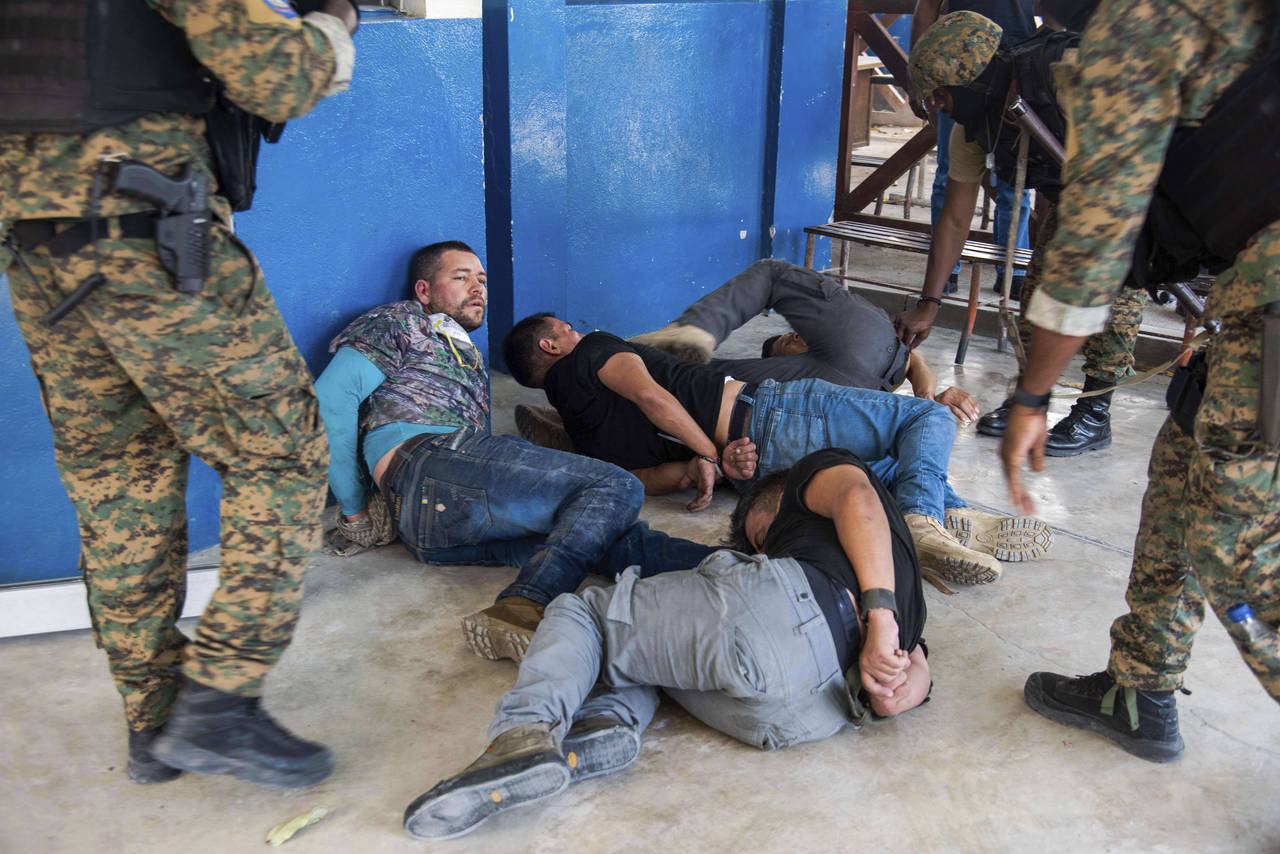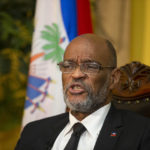EXPLAINER: Haiti’s troubled history of foreign interventions
Oct 10, 2022, 8:47 PM | Updated: Oct 11, 2022, 10:17 am

FILE - Suspects in the assassination of Haiti's President Jovenel Moise are tossed on the floor after being detained, at the General Direction of the police in Port-au-Prince, Haiti, Thursday, July 8, 2021. Haiti Prime Minister Ariel Henry and 18 top-ranking officials have requested on the second week of Oct. 2022, the immediate deployment of foreign armed troops as gangs and protesters paralyze the country. ( AP Photo/Jean Marc Hervé Abélard, File)
( AP Photo/Jean Marc Hervé Abélard, File)
SAN JUAN, Puerto Rico (AP) — Haitian Prime Minister Ariel Henry and 18 members of his cabinet have requested the immediate deployment of foreign troops in response to gangs and protesters who have paralyzed the country.
Fuel, water and other basic supplies have dwindled nearly a month after one of Haiti’s most powerful gangs blocked access to a main fuel terminal in Port-au-Prince where more than 10 million gallons of gasoline and diesel are stored, along with more than 800,000 gallons of kerosene. In addition, demonstrators have blocked roads in the capital and other main cities to demand Henry’s resignation and protest rising fuel prices after the prime minister announced in early September that his administration could no longer afford to subsidize fuel.
Gas stations and schools remain shuttered. Banks and grocery stores are operating on a limited schedule.
The United Nations secretary-general has offered the Security Council various options, including the immediate deployment of a rapid action force.
Opponents claim Henry hopes to use foreign troops to keep himself in power – a leadership he assumed last year after the assassination of President Jovenel Moïse and that many consider illegitimate because he was never elected nor formally confirmed in the post by the legislature. He has failed to set a date for elections, which have not been held since November 2016, but has pledged to do so once the violence is quelled.
Here is a look at previous foreign military interventions in Haiti and the impact they’ve had on the country of more than 11 million people:
HOW MANY FOREIGN MILITARY INTERVENTIONS HAVE THERE BEEN IN HAITI?
Since the early 1900s, there have been at least three major foreign military interventions in Haiti led by the United States and the United Nations.
The U.S. first occupied Haiti from 1915 to 1934.
Nearly 60 years later, the U.N. launched a peacekeeping mission in 1993, followed by the arrival of U.S. troops in 1994. Another intervention occurred in 2004. The first of those was to restore President Jean-Bertrand Aristide to power. The second followed a rebellion that removed him again.
WHAT LED TO THE INTERVENTIONS?
The interventions came at moments of great political instability.
Seven Haitian presidents were ousted or killed from 1911 to 1915, prompting U.S. President Woodrow Wilson to send U.S marines to Haiti in 1914. The U.S. removed half a million dollars from the Haitian National Bank for alleged safekeeping in New York. A formal U.S. occupation began in July 1915 and lasted until August 1934.
In September 1994, the U.S. sent more than 20,000 troops and two aircraft carriers to Haiti as part of an operation dubbed “Restore Democracy” under President Bill Clinton. The aim was to restore to power Aristide, who had been ousted in a 1991 military coup. Aristide had become Haiti’s first democratically elected president the year before. A smaller contingent of U.S. troops remained in Haiti until early 2000, often under U.N. auspices.
A parallel United Nations peacekeeping effort was launched in September 1993 and ran until 2000.
Aristide was overthrown again in February 2004 in a rebellion originally launched by a street gang. The U.S., which had pushed him to resign, flew Aristide out of the country and sent troops — as did Canada, France and Chile. They were soon replaced by troops of the United Nations Stabilization Mission in Haiti, which stayed until 2017.
WHAT IMPACT HAVE FOREIGN INTERVENTIONS HAD ON HAITI?
Robert Fatton, a Haitian politics expert at the University of Virginia, said that overall, “The occupations didn’t really improve anything in Haiti.”
He said the 1915-1934 occupation created a unified Haitian military, which was the country’s dominant force until the dictatorial regime of François Duvalier and later his son, Jean-Claude Duvalier, from 1957 to 1986.
The occupation also established a type of unpaid forced labor known as “corvée” in which U.S. officials used Haitian peasants to build roads, railroads and other infrastructure.
“The occupation was very coercive,” Fatton said. “It was also very centralizing and … very racist.”
He said the second intervention in 1994 was more popular because it helped restore the charismatic Aristide, a former priest who once served poor communities.
The invasion led to the creation of Haiti’s National Police, which effectively replaced the Haitian Army that was disbanded in 1995, though many police officers were former soldiers.
However, there were two failed coup attempts during that occupation and deepening political chaos.
The U.N.’s 2004-2017 peacekeeping mission was marred by allegations of sexual assault by its troops and staffers and the fact that peacekeepers from Nepal were blamed for introducing cholera into Haiti’s largest river in October 2010 by sewage runoff from their base. The U.N. has since acknowledged it played a role in the epidemic and that it had not done enough to help fight it, but it has not specifically acknowledged it introduced the disease.
Fatton said that while the U.N. mission “established a modicum of order,” in Haiti, it was a “very repressive organization.”
“To destroy gangs, they used forceful means. That left a very bad taste with poor Haitians,” he said, noting that they live side-by-side with gangs in slums. “Whether you’re with the gangs or not, you suffered the consequences.”
Copyright © The Associated Press. All rights reserved. This material may not be published, broadcast, rewritten or redistributed.
























